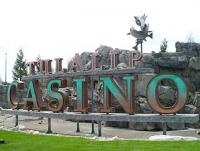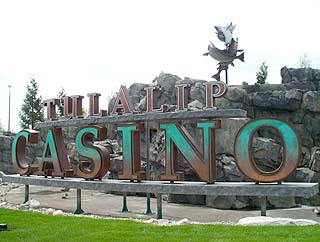 Washington State is one of the few states in the US that has an outright ban on all forms of online gambling. Court challenges from Poker Players Alliance were soundly rejected by the State Supreme court but numbers released by the Washington State Gaming Commission show the citizens of the state are gambling more despite the ban.
Washington State is one of the few states in the US that has an outright ban on all forms of online gambling. Court challenges from Poker Players Alliance were soundly rejected by the State Supreme court but numbers released by the Washington State Gaming Commission show the citizens of the state are gambling more despite the ban.
In Washington gamblers can get their fun from two groups, first the state itself offers limiting gambling options in the form of bingo halls, card rooms, pull tabs, horse racing, card rooms and of course lotteries.
Second, gamblers in Washington State can enjoy themselves at Las Vegas style Tribal Casinos. Washington State has 28 Tribal Casinos run by 22 different tribes. The Casinos offer a full slate of slots and casino games.
The Washington State Gaming Commissions numbers show that gamblers are choosing the Tribal Casinos over the state run gambling options.
In 2005, before the passage of the Unlawful Internet Gambling Enforcement Act (UIGEA) the Tribal Casinos ret gambling receipts totaled $1.023 billion. All other forms of regulated gambling in the state totaled $672 million. Tribal Casinos made up 61% of all action in the state for 2005.
The 2010 numbers show a huge swing increase in the Tribal Casinos revenues and a dip in the state run gambling revenue. The Tribal Casinos 2010 revenues came in at $1.745 billion, roughly a 70% jump in five years.
For the state, gaming receipts have dropped to $574 million for 2010, a drop of almost 15% over the five years.
This is more bad news for the government trying to deal with budgetary concerns, as the State doesn’t share in the Tribal gaming revenues.
In 2005, the Gaming Commission negotiated a deal with the Spokane Tribe, the deal included a six-tier revenue sharing in exchange for 7,000 gambling machines. Governor Chris Gregoire, looking to slow the growth of gambling in the state, renegotiated the deal, nixing the revenue sharing portion and only allowing 4,700 machines to the Spokane Tribe.
Some estimates suggest that had the original deal gone through and was expanded to the other Washington State Tribes, the State government could have taken in well over $100 million in revenues.






